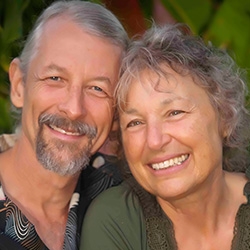

Search Results: jackal
-
Trainer tip: When we express moralistic judgments we are implying that other people are wrong or bad because they don’t act in ways that are in harmony with our values. Judging the situation or people can create distance and hurt. Instead, we can express our needs and how we're affected, bringing greater connection and healing. Today, notice how often you judge, and how you feel when you judge.
-
Trainer tip: Various life circumstances that can seem to be something that we don't want, and we may think of them as bad. And then later the situation may reveal that it's a circumstance that we do want, and we may think of it as good. Instead, of evaluating our day as good or bad we can acknowledge the feelings and needs that are present. Read on for a few anecdotes that illustrate this.
-
Trainer tip: Judging others can affect our ability to communicate effectively with that person, or enjoy the relationship. Translating the static judgments (enemy images) we have of others into our own and others' feelings and needs can help us move into greater understanding, healing, and relief -- which can foster compassion and connection. Read on for more.
-
Trainer tip: Be aware of times when you are judging others, demanding, making comparisons, or denying responsibility for your actions. Notice how these communication patterns affect your connection with other people.
-
This telecourse recording is for anyone wanting to integrate empathy into his/her life in a more natural, authentic way.
-
How excited do you get about connecting with people who are proving themselves right and who act like they know it all? Do you prefer the company of not-knowers who are in awe of the mystery of life and exploring with humility and innocent curiosity? Masking our vulnerability in not-knowing can point to deep wounds inside us, where perhaps the common denominator is our desire to prove our worth.
-
In this brief audio snippet, CNVC Certified Trainer and founder of the CNVC Parenting Project, Inbal Kashtan, offers a profound insight that can change how we see and relate to our children.
-
In this brief audio segment, John Kinyon offers a guided tour of our inner maps of conflict, including interpersonal mediation, chooser/educator, enemy images and making amends maps.
-
Explore self-empathy with an exercise to connect more deeply with your needs.
-
A fishbowl discussion on privilege, racism awareness, and empathy in NVC.
-
We can get stuck in our heads. All kinds of thoughts float into our minds. We then get thoughts about those thoughts, they might even make you feel a certain way or change a behaviour. But what happens when we connect our feelings with the physical sensations in our bodies? As part of our teaching at NVC we have incorporated movement work to help us connect with where we hold emotions and how we can process them effectively.
-
Judging or criticizing others indicates pain, unmet needs and a coping strategy. It distracts you from yourself and can give you the illusion of control. You may think you see more than they do, imagining criticism will bring change. But even a correct analysis won’t inspire change if they hear criticism. Instead, the moment you notice judgments or criticism turn towards yourself with compassion. What are your feelings and needs?
-
This video with Jim and Jori Manske explores how to navigate polarizing conversations.
-
When feeling unworthy, powerless, or afraid, we can hear others' comments as criticism, rejection, demands, limits, or attacks. Practice self-compassion, release attachments, and ask “How can I stretch the boundaries of who I believe myself to be, in service of love?”. Try replacing love with a word that inspires you (e.g. freedom, thriving, etc). Note answers that arise later. Or explore the question with a trusted person or in a journal. Read on for examples.
-
What is self-empathy? Mary Mackenzie leads you on an exploration of self-empathy through an exercise that will show you how you can easily connect more deeply with your needs.
-
Building your body and mind awareness can help you better regulate/calm your emotions. Regular self-empathy will help you better regulate your emotions as well as increase your body and mind awareness. If you are not aware of amygdala activation (fight/flight/freeze response), you will react instead of responding with choice. Use this eight-step process to develop your self-empathy/regulation skills.
-
Exploring how to keep NVC natural and authentic without sounding mechanical or formal.
-
Some of my core beliefs make experiencing gratitude difficult . For example, it’s difficult to celebrate others or myself when I think I have to prove my worth in order to be accepted. So much energy goes into proving myself, there’s little left for celebration.
-
Veteran Trainer Sylvia Haskvitz reviews the key distinctions/differentiations in NVC.
-
This explores four types of feedback: destructive, constructive, by demonstration, and dialogue.

Quick Links
Subscription Preferences
Stay In Touch!
Looking for ways to keep up with NVC Academy news, get special offers, free resources, or words of inspiration? Here are five ways to stay engaged:



















